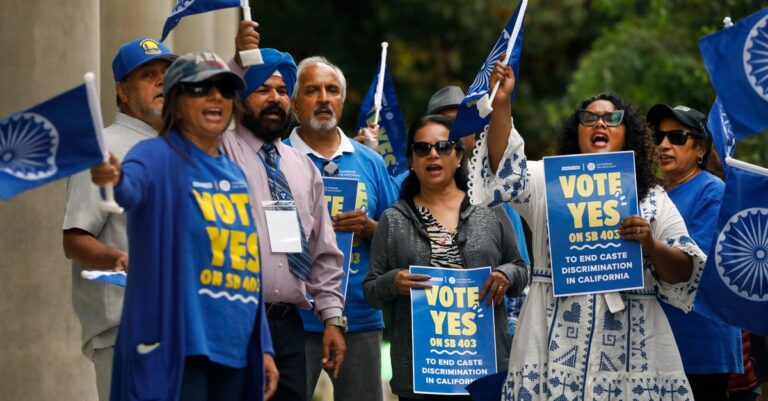
[ad_1]

California Gov. Gavin Newsom (D) vetoed a bill on Saturday that would have banned caste discrimination in the state.
Senate Bill 403 would have added caste to the definition of ancestry in the state’s already existing nondiscrimination law. Before the veto, California was slated to become the first state in the U.S. to ban caste discrimination under the Unruh Civil Rights Act, Fair Employment and Housing Act and Education Code.
The caste system is a structure of oppression that places people in a social hierarchy based on a caste that they are born into. The system originated in South Asia, but is pervasive and exists all over the U.S. and the world. Caste discrimination became illegal in India in 1950, but Dalits, the lowest caste in the hierarchy, are still impacted by it in India, other South Asian countries and across the world, including the U.S.
Newsom said in his veto letter on Saturday that the bill is “unnecessary,” as caste discrimination is already prohibited under the state’s existing civil rights protections, which “shall be liberally construed.”
The veto follows just a few days after two Republican senators sent a letter calling for the veto, stating that the bill was “discriminatory” and would “not only target and racially profile South Asian Californians, but will put other California residents and businesses at risk and jeopardize our state’s innovative edge.”
A 2016 report from Equality Labs, an anti-caste organization led by Dalits, found that 25% of Dalits who responded to their survey said that they have experienced verbal or physical harassment based on their caste, and 60% experienced caste-based derogatory jokes and or comments.
The report also found that two out of three Dalits surveyed said they’ve been treated unfairly in the workplace because of their caste.
In 2020, a andmark lawsuit was filed against Cisco Systems Inc. alleging caste discrimination in the workplace. The suit marked the first time in history that a case was brought forward by a U.S. government department against a private company for caste discrimination, according to Vice, and led to widespread discussions about caste discrimination in the U.S.
It also spurred solidarity between others at the company, and prompted 250 Dalits employees from Google, Facebook, Microsoft, Apple and Netflix to speak out about their experiences with caste discrimination from their upper-caste colleagues.
California’s SB 403 was introduced in March by state Sen. Aisha Wahab (D), who said that caste discrimination is “a social justice and civil rights issue.” The hearings for the bill were one of the most attended in the session, according to Politico.
“This legislation primarily protects millions who live in silence and have never had such protections because there is little understanding of this issue. This bill is about protecting people who are vulnerable,” Wahab said in March when the bill was first introduced, AP reported.
HuffPost reached out to Wahab for comment on the veto and did not receive an immediate response.
California’s South Asian community was divided by the bill. Several groups were opposed to the legislation, such as the Hindu American Foundation, who had said in March that the bill “unfairly maligns, targets and racially profiles select communities on the basis of their national origin, ethnicity and ancestry for disparate treatment.”
Meanwhile, caste equity activists who supported the bill held a hunger strike outside of Newsom’s office last month to put pressure on him to sign it, NBC News reported.
“This system is an inhumane system, it’s psychological and mental trauma,” Nirmal Singh, one of the hunger strike participants, said last month according to NBC News. “As the father of two wonderful girls, it becomes very important for me to do my best to create an environment for them which is safe, and which is conducive to their personal growth … I want to leave for them a safe California.”
In February, Seattle became the first city in the U.S. to ban caste discrimination, followed by Fresno, California in September.
[ad_2]